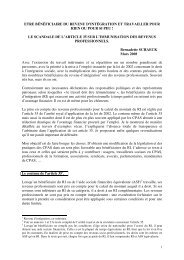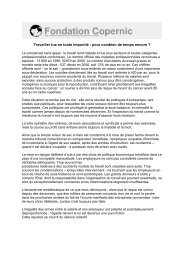Awra Amba RJ 300612 EN - Contacter un comité local d'Attac
Awra Amba RJ 300612 EN - Contacter un comité local d'Attac
Awra Amba RJ 300612 EN - Contacter un comité local d'Attac
You also want an ePaper? Increase the reach of your titles
YUMPU automatically turns print PDFs into web optimized ePapers that Google loves.
4. Social organisation<br />
twelve small individual rooms, which are maintained by the comm<strong>un</strong>ity. In 2005 four to six elderly<br />
lived here (At05/57); in 2010 eight of these rooms were used by people between the ages of 75 and<br />
90, two of them being outsiders to the comm<strong>un</strong>ity. The comm<strong>un</strong>ity no longer took old people from<br />
outside due to lack of means (Jo10b/6). The situation has not changed in 2012 (Crespo, 20112).<br />
Picture 13: Bedrooms for elderly, in 2010.<br />
4.6. F<strong>un</strong>eral ceremonies<br />
In most Ethiopian societies, f<strong>un</strong>eral ceremonies (as weddings) give the opport<strong>un</strong>ity relatives coming<br />
sometimes from far away to gather, to share their experiences and to build some common (Yi07/52).<br />
In the Amhara region, the family and the close relatives of a deceased orthodox person are many<br />
crying and wailing in the house of the deceased; when the keening rises to its peak, some beat their<br />
bodies and throw themselves into the gro<strong>un</strong>d aro<strong>un</strong>d the bed of the deceased. In parallel, the body of<br />
the deceased is prepared to make easier the new existence of the soul and its journey to another<br />
world. Wailing continues and gets louder in the church. After the burial, the family, the friends and<br />
neighbours can stay several days with the close relatives of the deceased, in a tent beside the house,<br />
women crying and wailing intensively. On the third day, before s<strong>un</strong>rise, family members and<br />
relatives go to the churchyard, offering food and drink and keening. The participation to these<br />
ceremonies is a sign of respect towards the deceased: to fail to attend the ceremonies without<br />
important reasons, it is placing himself outside the comm<strong>un</strong>ity, and being possibly ex-comm<strong>un</strong>icated<br />
or sanctioned by the comm<strong>un</strong>ity. To cry and to wail show the attachment to the deceased. Some ones<br />
can cut short the hair, wear black clothes, women can remove their ornaments, not apply butter or oil<br />
on their hair during the whole period of bereavement (At05/67-68).<br />
The Muslim comm<strong>un</strong>ities close to <strong>Awra</strong> <strong>Amba</strong> perform very similar ceremonies, the main difference<br />
being that women do not take part in burial; otherwise they would become sterile. Wailing is<br />
moreover less bitter than among the Orthodox, and occurs only on three occasions: when the soul is<br />
separated from the body, when the corpse is taken out of the house for burial, and when the body is<br />
buried. Orthodox priests advice for that matter these same restrictions of wailing, which must not be<br />
"exaggerated".<br />
For every case, a f<strong>un</strong>eral attending by many people is regarded as the most respectable ceremony<br />
(At05/68-69).<br />
The behaviour within the <strong>Awra</strong> <strong>Amba</strong> comm<strong>un</strong>ity is completely different. Following the death of a<br />
comm<strong>un</strong>ity member, only a 'reasonable' number of people attend the f<strong>un</strong>erals (Question 30 in<br />
Annex). The number varies according to the age of the deceased person: if it is a child, they are<br />
aro<strong>un</strong>d three or four people; if it is an adult, aro<strong>un</strong>d six or seven people. The rest of the people<br />
remain at home <strong>un</strong>til the people attending the burial are back (Yi07/51). According to Zumra quoted<br />
59 / 85

















